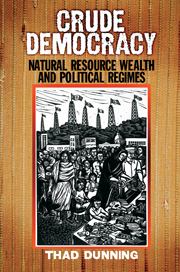Book contents
- Frontmatter
- Contents
- List of Figures
- List of Tables
- Preface and Acknowledgments
- Crude Democracy: Natural Resource Wealth and Political Regimes Cambridge
- 1 DOES OIL PROMOTE DEMOCRACY?
- 2 THE FOUNDATIONS OF RENTIER STATES
- 3 RESOURCE RENTS AND THE POLITICAL REGIME
- 4 STATISTICAL TESTS ON RENTS AND THE REGIME
- 5 THE DEMOCRATIC EFFECT OF RENTS
- 6 RENTIER DEMOCRACY IN COMPARATIVE PERSPECTIVE
- 7 THEORETICAL EXTENSIONS
- 8 CONCLUSION: WHITHER THE RESOURCE CURSE?
- Appendix: Construction of the Simulations
- Bibliography
- Index
2 - THE FOUNDATIONS OF RENTIER STATES
Published online by Cambridge University Press: 17 July 2009
- Frontmatter
- Contents
- List of Figures
- List of Tables
- Preface and Acknowledgments
- Crude Democracy: Natural Resource Wealth and Political Regimes Cambridge
- 1 DOES OIL PROMOTE DEMOCRACY?
- 2 THE FOUNDATIONS OF RENTIER STATES
- 3 RESOURCE RENTS AND THE POLITICAL REGIME
- 4 STATISTICAL TESTS ON RENTS AND THE REGIME
- 5 THE DEMOCRATIC EFFECT OF RENTS
- 6 RENTIER DEMOCRACY IN COMPARATIVE PERSPECTIVE
- 7 THEORETICAL EXTENSIONS
- 8 CONCLUSION: WHITHER THE RESOURCE CURSE?
- Appendix: Construction of the Simulations
- Bibliography
- Index
Summary
This book proposes and tests a theory about the effects of natural resource wealth on the political regime. For purposes of developing this theory, I often take for granted that natural resource “rents” accrue to the state; this implies that extraordinary profits from natural resource production can provide a source of revenue for public spending. Much of the analysis then focuses on how the availability of rents in the fiscal coffers of the state shapes the development of political regimes; the third chapter, for instance, addresses the theoretical question of how the presence of rents may shape the chances for the emergence and persistence of democracy. The main theoretical contribution of that chapter, and of this book, is to argue that the flow of resource rents into the fiscal coffers of the state may have mixed effects on the propensity of countries to be democratic or authoritarian. In some settings, the democratic effect of rents will be relatively important, whereas in others the authoritarian effect will tend to triumph.
Yet this focus may seem to ignore an important prior question: how and why do states become “rentier states” in the first place?
- Type
- Chapter
- Information
- Crude DemocracyNatural Resource Wealth and Political Regimes, pp. 37 - 60Publisher: Cambridge University PressPrint publication year: 2008



